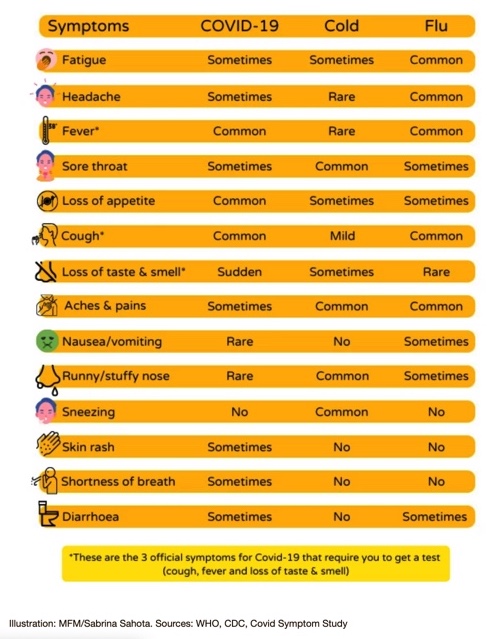Do I have COVID, a bad cold, allergies, or the flu? Many symptoms can overlap. In the spring and summer, it’s easy to wonder about allergies versus COVID. As we move indoors, colds, flu, and COVID can coincide. Learn how to tell the difference and use a helpful symptom checker.
Flu Versus COVID
Let’s start with the flu and COVID. Both are contagious respiratory illnesses that affect the lungs and spread similarly. However, they are caused by different viruses. Human influenza A and B viruses cause seasonal epidemics of disease (known as flu season) almost every winter in the United States. COVID-19 is caused by a coronavirus called SARS-CoV-2.
Here’s a list of the currently known COVID symptoms and their possible overlap with flu as well as common colds.

Yes, there are some areas of overlap between COVID and the flu:
- Headache: This is a very common symptom of flu. It is sometimes a symptom of COVID.
- Cough: This is common to any respiratory illness, so it’s common in both COVID-19 and the flu.
- Whole-body achiness, exhaustion: This is a common symptom of flu and sometimes occurs with COVID-19.
- Sore throat: This is sometimes a symptom of COVID as well as flu. A sore throat could also be a symptom of a bacterial strep infection, especially if you also have swollen glands.
- Fever/chills: This is common for both flu and COVID and infectious diseases, but not everyone with COVID will have a fever.
However, note that there is very little overlap in several other areas which can help you differentiate between the illnesses:
- New loss of smell and taste: This is among the most common early indicators of COVID infection; it’s often sudden and may persist long after the virus is no longer present. Flu does not instantly affect a person’s taste or smell.
- Trouble breathing that gets worse with exertion: This is not a common flu symptom. However, it is a common indicator of COVID if it later appears in combination with other symptoms such as cough and/or fever; it rarely occurs in the first days of a COVID infection. If no other symptoms are present, the breathing difficulty likely has another cause.
- Neurological symptoms sometimes occur with COVID, but not flu. These include tingling or numbness in the hands and feet, dizziness, confusion, delirium, seizures, and stroke.
Another difference: If a person has COVID-19, it usually takes longer to develop symptoms than if they had flu. Typically, a person develops flu symptoms anywhere from 1 to 4 days after infection. With COVID-19, a person often develops symptoms 5 to 7 days after being infected but also as late as 14 days.
Allergies Versus COVID
Use common sense. If you get allergy symptoms such as itchy eyes every spring and early summer when the trees are blooming, you are probably you’re suffering from the usual allergy symptoms. If allergy medications alleviate your symptoms, that’s another clue it’s NOT Covid.
However, if you are not only sneezing, but also experiencing sudden fatigue or body aches, this is a clue it may be COVID. In this case, you should test yourself with a COVID test.
Let’s review the most common symptoms:
Allergies
• Itchy eyes, throat, or ears
• Dry coughs without mucus
COVID
• High fevers
• Upset stomach, which causes nausea, vomiting, and diarrhea
• Body aches, sudden fatigue
If you or anyone in your household does experience COVID symptoms, call your doctor to see if s/he recommends getting tested. We hope that you all find this helpful!
Note: This information was accurate at the time of the writing. However, you should check the CDC site for the most up-to-date coronavirus disease information.
Reviewed and edited for medical accuracy by infectious disease expert and physician Dr. Judy Stone











Comments